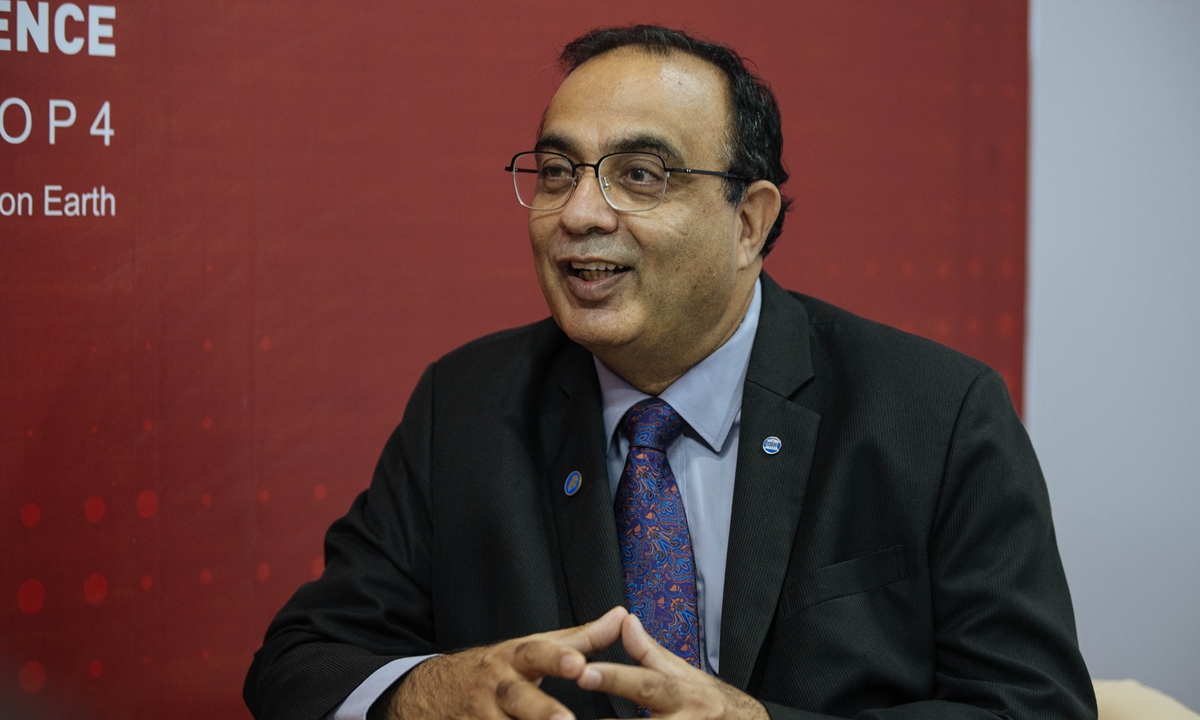
Professor Shahbaz Khan, Director and UNESCO Representative to China, the Democratic People's Republic of Korea, Japan, Mongolia and the Republic of Korea Photo: Li Hao/GT
China is taking the lead in the world and is an excellent example to provide solutions on global biodiversity with the concept of ecological civilization, and there are no boundaries in bringing good concepts to the world which needs good ideas more than ever amid the global crises of biodiversity loss, climate change and land desertification, a UNESCO representative said Tuesday on the sidelines of the 15th meeting of the Conference of the Parties to the Convention on Biological Diversity (COP15) being held in Kunming, Southwest China's Yunnan Province.
Professor Shahbaz Khan, director and UNESCO representative to China, the Democratic People's Republic of Korea, Japan, Mongolia and the Republic of Korea, told the Global Times that China's ecological civilization is a very important answer to global biodiversity challenges and it has been realized in China through its implementation of the 13th Five-Year Plan (2016-20).
Khan said he is looking forward to the leadership of China making ecological civilization a reality for the world. "The amazing progress made by China is benefiting not only China but also the world," he noted.
He has seen China's progress, especially in the restoration of rivers and lakes through measures which are part of ecological civilization. He said that China has made great progress in protecting pandas, and species like deers and Siberian tigers in the Changbaishan biosphere reserve in Northeast China are important to biodiversity.
In listing examples of China's progress in biodiversity, Khan specifically mentioned the story of a herd of wandering elephants.
He said this is not just the story of the elephants, but a story through which people know how to take care of a very important species like Asian elephants as they gave birth during their journey, know how to use technologies like drones to track them, and know that we have a system which has been affected by human beings but can be compensated.
"This needs a new way of thinking of coexistence between nature and human beings," Khan said.
The biological and ecological systems are degrading very rapidly in the world, and this is the decade for action in sustainable development, and it's the right time for various parties to build a shared future for all, he said.
Khan said there are no boundaries in terms of bringing good ideas or concepts to the world. The world needs good ideas more than ever.
When China hosted global summits such as the Extended 44th session of the World Heritage Committee, China did not "dictate anything" and all nations worked together and developed a consensus, Khan said.
UNESCO is working with China to promote Chinese practices, and the agency is running a training program for East Asia, sharing many examples from China in areas such as how to brand or ecologically label products of UNESCO biosphere reserves, and how other countries can learn from it, Khan said.
China is also helping other countries achieve sustainable development goals, and he listed examples of China using satellites to help Pakistan manage floods and water resources.
"China is promoting multilateralism, supporting the UN system, helping other countries which need support on biodiversity, not just bilaterally, but multilaterally through mechanisms such as the South-South Cooperation and Shanghai Cooperation Organisation," he said, noting that multilateralism is critical when we are losing one species every minute when we don't even know about where those species are.
"The COP15 meeting is very important as when nations talk to each other, the political agendas will go away, and it has to be all nations working together. That's the way we can get rid of politicization," he said.




